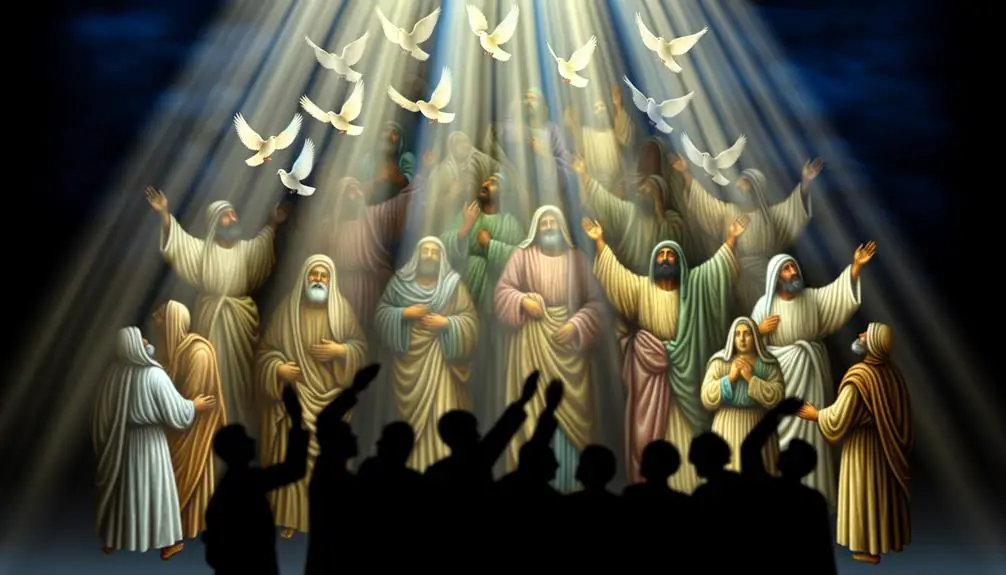Explore how the divine manifests in subtle and grand ways in the Bible, inviting a deeper understanding of faith and divine interaction.

Manifest in the Bible
In the Bible, God speaks through burning bushes and silent whispers; He demonstrates His power through miracles and simple acts of faith.
You'll find that the concept of manifestation isn't just about grandiose events but also about the subtle ways in which the divine interacts with the human.
As you explore these narratives, you'll uncover a rich tapestry of how belief, action, and divine will intertwine.
This journey promises to redefine your understanding of manifestation, leaving you to ponder how these ancient stories might reflect in your own life's experiences.
Key Takeaways
- Divine encounters signify a transformative alignment with God's will and purpose.
- Faith and worship practices are vital for manifesting God's presence and promises.
- Prophetic visions and miracles demonstrate God's authority and guide believers' actions.
- Spiritual leadership involves humility and a commitment to follow God's direction.
Understanding Biblical Manifestation

To grasp the concept of biblical manifestation, it's essential to explore its foundations within the sacred texts, recognizing its profound implications for faith and practice. You'll find that biblical manifestation diverges significantly from the contemporary understanding often associated with the law of attraction. Instead of focusing solely on material gains or personal desires, biblical manifestation emphasizes spiritual alignment with God's will. This distinction is crucial, as it places the source of power and the object of desire outside oneself, rooted in a divine relationship.
You're invited to consider the stories of Abraham, Joseph, and Moses, among others, as exemplars of this principle. Their lives illustrate not a mere wishful thinking but a deep, abiding faith in God's promises, coupled with action aligned with His directives. It's this blend of trust and obedience that activates the manifestation of God's promises in their lives, rather than the self-centered visualization techniques often promoted by the law of attraction.
Moreover, the concept of spiritual alignment found in these narratives underscores the importance of aligning one's desires, actions, and intentions with God's purposes. This alignment isn't about manipulating spiritual forces to one's advantage but about submitting to God's plan, trusting that He knows and wants what's best for His children. Hence, biblical manifestation teaches you to seek first the kingdom of God and His righteousness, with the assurance that all these things shall be added unto you, as outlined in Matthew 6:33.
In essence, understanding biblical manifestation requires a perspective shift from self to the sovereignty of God, marking a journey towards spiritual maturity and divine fulfillment.
The Burning Bush Encounter

You'll find that the Burning Bush Encounter is pivotal in understanding how divine encounters are defined within the biblical narrative.
By examining Moses' response, insights into human interaction with the divine emerge, highlighting the complexities and reverence involved.
Furthermore, the symbolism of the bush itself offers a rich tapestry of interpretation, inviting a deeper appreciation of its significance in biblical theology.
Divine Encounter Defined
A divine encounter, exemplified by Moses' experience at the Burning Bush, marks a pivotal moment where the human meets the divine in a transformative interaction. This narrative isn't just a historical account; it's a profound lesson on spiritual awakening and divine callings, deeply influencing modern interpretations and spiritual practices.
- Revelation: The divine reveals itself, demanding attention and reverence.
- Commission: A specific purpose or mission is imparted.
- Transformation: The encounter fundamentally changes the individual's perspective and life direction.
- Faith: It requires an unwavering belief in the unseen.
- Obedience: A prompt and willing response to the divine command.
Analyzing this encounter encourages you to reflect on your own spiritual journey, recognizing moments of divine intervention and their impact on your life path.
Moses' Response Examined
Reflecting on the divine encounter, we now examine Moses' response during the pivotal Burning Bush moment, highlighting his initial hesitation and subsequent acceptance of God's mission. This episode reveals much about leadership fear and the complex path to reluctant acceptance.
Moses' trepidation is palpable, embodying the fear many feel when called to a daunting task. Yet, it's his journey from doubt to duty that encapsulates a profound transformation. His dialogue with God showcases a negotiation between human frailty and divine assurance.
Moses' eventual 'yes' isn't merely compliance but a deep, albeit reluctant, acceptance of his role in a larger narrative. This transition from fear to faith underlines the essence of spiritual leadership, marked by humility, perseverance, and an ultimate trust in the divine directive.
Symbolism of the Bush
In the heart of the Burning Bush encounter, the bush itself emerges as a profound symbol, intertwining divine presence with the resilience of faith amidst trials. This moment transcends mere natural phenomena, inviting a rich tapestry of cultural interpretations.
- Unconsumed yet Aflame: Represents an enduring faith that isn't consumed by trials.
- Divine Presence in the Mundane: Illustrates how the sacred manifests within the ordinary.
- Guidance amidst Uncertainty: Signals divine direction in moments of doubt.
- A Call to Action: Embodies a divine summons to embrace one's purpose.
- Interplay of Natural and Supernatural: Highlights the seamless integration of divine intervention within natural settings.
Each element invites you to reflect on the multifaceted ways in which faith and divine presence manifest within your life and the world around you.
Miracles of Jesus Christ

You encounter the miracles of Jesus Christ as profound demonstrations of His divine authority and compassion.
Through healing the sick and multiplying food, He not only addressed physical needs but also imparted spiritual lessons of faith and providence.
These acts serve as pivotal points for understanding His ministry and the nature of divine intervention in human affairs.
Healing the Sick
Jesus Christ's ministry on earth was marked by numerous miracles, notably his compassionate healing of the sick, which underscores his divine authority and unwavering mercy. These miraculous healings weren't merely acts of kindness but served a deeper purpose, reflecting the profound spiritual truths of the Christian faith.
- *Prayer efficacy* is evident in the healings, demonstrating the power of faith and prayer in invoking divine intervention.
- These miracles reinforce *Apostolic traditions*, establishing a foundation for the practices of the early church.
- They signify the breaking in of God's kingdom, offering a foretaste of the restoration of all things.
- Jesus' healings challenge us to embrace compassion and mercy in our interactions.
- They invite believers to participate in God's healing work, emphasizing the role of the church as a conduit of divine grace.
Multiplying Food
Among the most profound of Jesus Christ's miracles is the multiplication of food, showcasing divine provision and the abundance of God's grace. This act, often referred to as the loaves multiplication and fish abundance, serves not only as a testament to Christ's ability to meet physical needs but also symbolizes spiritual nourishment and the inexhaustible nature of divine generosity.
Analyzing these miracles, you'll notice they underscore a fundamental principle: what's offered to God, no matter how small, can be transformed into something vastly greater. These acts of multiplying food aren't just about alleviating hunger; they're profound demonstrations of Jesus's authority over nature and his dedication to caring for his followers.
Through these miracles, Christ teaches us the importance of trust and sharing, even in scarcity.
Prophetic Visions and Dreams

The Bible frequently employs prophetic visions and dreams as divine mediums through which God communicates his will and future events to humanity. These narratives aren't just ancient stories; they offer insight into how dream interpretation and visionary guidance play crucial roles in understanding God's messages. As you delve into these accounts, you'll find they aren't merely for entertainment or historical record but serve a deeper, spiritual purpose.
- Divine Communication: Prophetic dreams and visions in the Bible act as direct lines of communication from God, offering guidance, warnings, and revelations about one's path and the fate of nations.
- Spiritual Insight: They provide a unique lens through which to view the spiritual realm, revealing truths that transcend human understanding and highlighting the interconnectedness of the divine and the mortal.
- Personal Transformation: Through these divine encounters, individuals are often called to action or transformation, illustrating the profound impact of heavenly guidance on human lives.
- Community Guidance: Visions and dreams frequently serve as the means by which God conveys his plans and expectations to leaders, impacting the direction and destiny of entire communities or nations.
- Symbolic Language: The symbolic and often enigmatic nature of these communications emphasizes the importance of discernment and interpretation, inviting a deeper engagement with the divine message.
In exploring these divine encounters, you're invited into a contemplative space where the spiritual and material worlds intersect. Through prophetic visions and dreams, the Bible not only documents historical events but also imparts timeless wisdom and guidance for those seeking to understand their place in God's overarching plan.
Manifestation Through Faith

Building on the understanding of divine communication through prophetic visions and dreams, we now explore how manifestation through faith plays a crucial role in bringing God's promises to fruition in one's life. The Bible illustrates that faith dynamics aren't merely passive acceptance but involve an active trust and reliance on God. This trust isn't blind but is founded on the character and promises of God as revealed in Scripture.
You'll find that spiritual growth is intrinsically linked to the development of faith. As you delve deeper into your relationship with God, your faith matures, enabling you to manifest the reality of God's promises in your life. Hebrews 11 is often referred to as the 'faith chapter,' showcasing individuals who, through faith, saw the unseen and welcomed God's promises from a distance. Their experiences teach us that faith is the substance of things hoped for, the evidence of things not seen.
Moreover, faith acts as a catalyst in the believer's life, propelling you towards God's plans and purposes. It's through faith that you can move mountains, metaphorically speaking, and see the impossible become possible. However, this faith isn't static; it's dynamic, requiring nurturing through prayer, meditation on God's Word, and obedience to His directives.
In essence, the manifestation of God's promises through faith is a testament to the believer's trust in God's sovereignty and goodness. It's a journey of spiritual growth, where faith dynamics play a pivotal role. As you continue to trust in God's faithfulness, you become a living testimony of His power and love at work in the world.
Signs and Wonders in Acts

Delving into the book of Acts, we observe how signs and wonders serve as divine affirmations of the apostles' ministry, compelling believers and non-believers alike to recognize God's power at work. This period marks a transformative era, beginning with the Pentecost event, where the Holy Spirit's descent empowered the apostles with unprecedented boldness and authority. The subsequent miracles performed not only validate their message but also deeply enrich the believers' faith, weaving a tapestry of divine interaction that's both inspiring and instructive.
- Confirmation of the Gospel: The miraculous acts serve as undeniable evidence that the message of Jesus is true, encouraging faith among skeptics.
- Empowerment through the Holy Spirit: These events underscore the apostles' reliance on the Holy Spirit, showcasing that their boldness and ability to perform wonders aren't of their own making.
- Community Formation: The awe and wonder elicited by these signs play a crucial role in the formation and growth of the early Christian community, drawing more individuals to the faith.
- Faith Deepening: Witnessing or experiencing these miracles first-hand profoundly deepens the believers' faith, reinforcing their commitment to the apostolic teachings.
- A Foretaste of the Kingdom: The signs and wonders are seen as a foretaste of the coming Kingdom of God, where God's power fully manifests in healing, restoration, and transformation.
In this light, the acts of signs and wonders within the book of Acts aren't merely historical footnotes. They're pivotal moments that reveal the depth of God's engagement with His creation, catalyzing the spread of the Gospel through the apostles' boldness and the believers' fortified faith.
God's Presence in Worship

Exploring God's manifest presence in worship reveals how believers encounter the divine in profound and transformative ways. This spiritual phenomenon isn't confined to abstract experiences but is deeply rooted in the Bible's depiction of temple rituals and spiritual disciplines. As you delve into scripture, you'll notice that temple rituals were designed not merely as religious obligations but as conduits through which God's presence was invited and experienced. These ancient practices highlight the importance of reverence, purity, and intentionality in approaching God.
Moreover, the role of spiritual disciplines in experiencing God's manifest presence can't be overstated. Practices such as prayer, meditation, fasting, and the study of scripture serve as vehicles for drawing nearer to God. They're not just tasks to be checked off a spiritual to-do list but are avenues for encountering God in a deeper, more personal way. Through these disciplines, you're invited to engage in a heartfelt pursuit of the divine, fostering a space where God's presence can be vividly manifested.
This deep engagement with temple rituals and spiritual disciplines underscores a critical truth: God's presence in worship isn't passive. It requires active participation and a sincere heart. As you commit to these practices, you allow yourself to be transformed by the divine encounter, reflecting the profound impact of God's presence in the lives of believers. It's a journey that not only brings you closer to God but also shapes you into a vessel through which His presence can be manifested to others.
Frequently Asked Questions
How Do Different Christian Denominations Interpret the Concept of Manifestation in the Bible, and What Are the Theological Implications of These Interpretations?
You're exploring how Christian groups view manifestation, focusing on divine intervention and spiritual gifts. Each denomination interprets these concepts uniquely, significantly impacting their theology.
For some, it's about God's direct action in the world; for others, it's about the believer's empowerment. This diversity leads to rich theological debates, influencing practices and beliefs about how God interacts with humanity and how individuals might access or demonstrate spiritual power.
Are There Any Instances in the Bible Where Manifestations Led to Misunderstandings or Conflicts Among the Followers of God, and How Were These Resolved?
You're exploring how divine misunderstandings and their resolutions shape beliefs. Instances where followers misinterpret divine intentions often lead to conflicts. Yet, these moments serve as pivotal for growth and understanding.
Through dialogue, reflection, and guidance, conflicts find resolution, deepening faith. This process underscores the importance of clear communication and the role of leaders in mediating misunderstandings, ensuring that the community remains united in their spiritual journey and interpretation of sacred texts.
How Does the Concept of Manifestation in the Bible Align or Contrast With Notions of Manifestation in Other Religious Texts or Spiritual Traditions?
When you explore manifestation across spiritual traditions, you'll notice cosmic parallels and elements of spiritual syncretism.
Consider how the concept of divine intervention in various religions might mirror or diverge from biblical accounts.
These narratives share a reverence for the transcendent, yet the methods and interpretations of manifestation may vary, reflecting diverse theological frameworks.
This comparison not only enriches your understanding but also highlights the interconnectedness of human spirituality.
Can Manifestations in the Bible Be Considered as Metaphors for Psychological or Emotional Experiences, and How Has Modern Psychology Engaged With These Biblical Narratives?
You're delving into how manifestations can symbolize psychological or emotional experiences, exploring the intersection of modern psychology and these narratives. Scholars analyze these stories, seeking psychological symbolism and emotion interpretation, to understand how they mirror our inner experiences.
This approach reveals how ancient narratives continue to inform contemporary psychological thought, offering insights into the human condition. It's a fascinating blend of reverence for tradition and scholarly analysis, enriching our understanding of both.
What Role Does the Concept of Free Will Play in Biblical Manifestations, and Are There Examples Where Human Agency Directly Influenced the Occurrence or Outcome of a Divine Manifestation?
When you explore the concept of free will, you're delving into how your choices influence divine intervention. The Bible presents numerous instances where human agency shapes the outcome of divine manifestations, showcasing the profound impact of choice consequences.
This interaction underscores a dynamic relationship between the divine and human will, inviting a deeper reflection on the role of personal agency in spiritual narratives and the reverent acknowledgment of its power in shaping divine encounters.
Conclusion
As you've journeyed through the biblical accounts of manifestation, from the enigmatic burning bush to the profound miracles of Jesus, a pattern emerges. It's clear that faith acts as the conduit through which the divine manifests.
Each story, whether of visions, miracles, or divine presence, invites you into a deeper relationship with the unseen. So, what lies ahead? It's a realm where faith meets action, and where, perhaps, your own story of manifestation awaits. Dare to explore.



Sign up